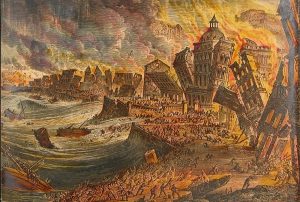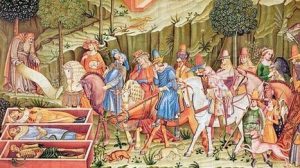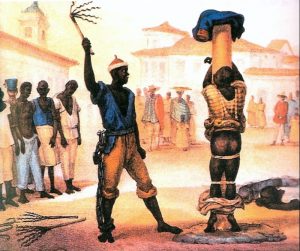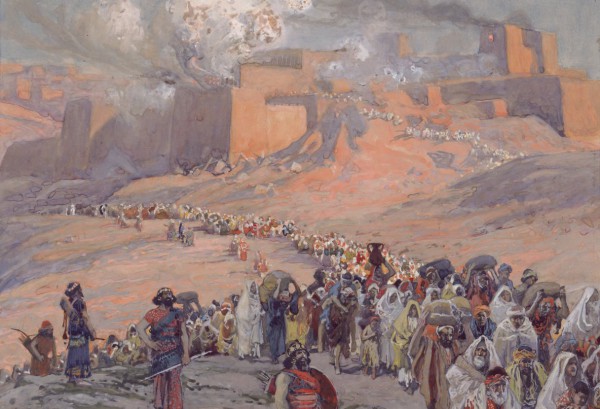In my last post on plausibility and credibility I had reason to quote N T Wright on how Deism first divorced God from nature back in the eighteenth century. But I didn’t mention the event commonly identified as the trigger for this radical rejection of the immanence of divine action, a rejection which persists (as I tried to show) until this day. That event was the Lisbon earthquake of 1755.
 The usual story about it is that the scale of this disaster – which seems to have had a death toll of around fifty thousand, making it one of the more destructive seismic events in history – made it impossible for enlightened people to believe that God is active in the world. But note the similarity of that to the argument I mentioned in John Robinson’s Honest to God about the Virgin Birth – we need to ascertain if we are we dealing with credibility or plausibility here.
The usual story about it is that the scale of this disaster – which seems to have had a death toll of around fifty thousand, making it one of the more destructive seismic events in history – made it impossible for enlightened people to believe that God is active in the world. But note the similarity of that to the argument I mentioned in John Robinson’s Honest to God about the Virgin Birth – we need to ascertain if we are we dealing with credibility or plausibility here.
Before I discuss the earthquake in the context of divine action, it’s worth reflecting on some older history. Firstly, the biblical teaching. I’ve investigated before how the covenanant blessings and curses of the torah base God’s ongoing governance of Israel on his total control both of natural phenomena (weather, crops, wild animals etc) and political events (including military success versus conquest and even exile), for good or ill.
The biblical history endorses such a theology, not only for the covenant nation Israel, but for the surrounding nations too. As regards natural disasters sent as judgements, the prime example is, of course, the Flood. But the judgement on the cities of the plain  in Genesis is another (and if current archaeology turns out to be correct, it may link to a demonstrable “natural” asteroid or cometary impact). Israel in the wilderness suffered several events like the plague of snakes, each attributed to sin and judgement, and remedied by repentance. Other plagues afflicted the Philistines when they abused the captured Ark of God, and likewise Israel under King David. The prophet Joel builds his whole oracle around a destructive locust plague, once again calling for national repentance.
in Genesis is another (and if current archaeology turns out to be correct, it may link to a demonstrable “natural” asteroid or cometary impact). Israel in the wilderness suffered several events like the plague of snakes, each attributed to sin and judgement, and remedied by repentance. Other plagues afflicted the Philistines when they abused the captured Ark of God, and likewise Israel under King David. The prophet Joel builds his whole oracle around a destructive locust plague, once again calling for national repentance.
Disasters inflicted by God through human agency are even more common, and I mention only a small selection here. Abraham is told about the future punishment of the Amorites (which will be at Israel’s hands), whose sin had not at that point yet reached a level requiring such action. Deuteronomy mentions several nations displaced by peoples other than Israel in order to show that national evil, not favouritism towards Israel, was the cause of God’s displacement of the Canaanites.
The early prophets predicted the downfall and exile of Samaria under the Assyrians for the northern kingdom’s idolatry. The major prophets predicted and chronicled in detail the destruction of Jerusalem for the same reason (whilst the little read Lamentations, and the prayers of Daniel and Nehemiah, for example, represent the penitent response of the godly to these events after their fulfilment). Daniel predicted the brutality of Antiochus Epiphanes in 165BC as punishment for rebellion against the covenant (which took the form of accommodation to Greek values). And finally, Jesus pinned his whole reputation as prophet and messiah on the future destruction (in 69-70AD) of temple and city because “you did not know the time of your visitation.”
Is a trumpet blown in a city, and the people are not afraid? Does disaster come to a city, unless the LORD has done it? (Amos 3.6)
Remove this category of teaching from the Bible and, to be honest, there is really no salvation history left at all. It is therefore not surprising that all the many natural and  political upheavals over many Christian centuries were taken, by godly people, as instances of judgement. Augustine’s great work The City of God took the troubles of the Roman Empire, and specifically the sack of Rome by the Visigoths, as marks of God’s judgement. Even the pagans believed the same, except that they blamed the Christians – a matter sometimes dealt with by the early apologists based on the same theology.
political upheavals over many Christian centuries were taken, by godly people, as instances of judgement. Augustine’s great work The City of God took the troubles of the Roman Empire, and specifically the sack of Rome by the Visigoths, as marks of God’s judgement. Even the pagans believed the same, except that they blamed the Christians – a matter sometimes dealt with by the early apologists based on the same theology.
Nowadays we tend to see this as problematic in terms of final causation: how could one ever guess exactly why God is displeased? Is it not entirely subjective to attribute natural or human disasters to divine justice (as opposed to divine negligence, which is appealed to remarkably regularly!)? Now, it’s true that there was seldom a prophet in the Christian era to deliver God’s moral verdict as there was in the Bible. But self-examination, in the context of communal prayer under the Holy Spirit, was rightly considered to be a fruitful response.
Even apart from that, though, the point was not simply that God was teaching a (rational) lesson, along the lines of “I’ve warned you about avarice and you wouldn’t listen, so I’ve sent this fire to focus your attention.” The point was that, through wisely appointed punishment, God actually changed unacceptable situations whether or not people understood the whys and wherefores. To take a modern instance, if God perhaps averted inevitable nuclear war by bringing down Russian communism, it doesn’t matter if nobody else saw that holocaust coming.
One graphic example of a Christian response to disaster taken to be at God’s hands was the Black Death – which wiped out maybe a third of Europeans. Historians could  tell us how it changed history – one well-known effect was the permanent improvement in dignity and working conditions for the lowest levels of society. But the godly self-examination and repentance the Black Death produced may be read in a work like Piers Plowman, just two decades later, which spoke truth to power, consciously in the shadow – or maybe the light – of the recent catastrophe. Certainly many did not heed the message of Piers – but society changed nevertheless, and not purely “by natural causes.”
tell us how it changed history – one well-known effect was the permanent improvement in dignity and working conditions for the lowest levels of society. But the godly self-examination and repentance the Black Death produced may be read in a work like Piers Plowman, just two decades later, which spoke truth to power, consciously in the shadow – or maybe the light – of the recent catastrophe. Certainly many did not heed the message of Piers – but society changed nevertheless, and not purely “by natural causes.”
In the late seventeenth century that understanding of God’s immanence in judgement (which was, after all, only the flip-side of his immanence in daily and national blessings) remained prevalent. Even as far away as Cornwall the Fire of London (following hard on the heels of the Great Plague) was taken as divine judgement. In London, sermons calling for repentance were combined with collections for the victims of the fire, and the response was huge. A national fast was called on 10th October, a month after the fire – little chance of that today after a similar disaster.
And so to 1755 and the Lisbon earthquake, when the atmosphere was different. Rationalist Deism already possessed the intelligentsia, though the form it tended to take was that of Leibniz, to whom God had created the best of all possible worlds (meaning, as I always point out, not that everything was rosy, but that everything was as rosy as rationally possible to the distant Creator). The disaster took the form we might now, in the light of Sri Lanka and Japan, recognise: a destructive earthquake centred in the Atlantic was followed by an emptying of Lisbon harbour, and then by a tsunami which overwhelmed the lower city in three separate waves. Inevitably the destruction of an important European capital soon became widely known.
The natural response of many, including both the clergy and the ordinary people of Portugal, was to attribute it to sin and pray. The Enlightened, however, found it more plausible to modify Leibniz’s theology to say either that God was so uninvolved in nature that “natural evil” (as they called it) occurred unhindered or, of course, that God did not intervene because he did not exist. In so doing they also re-cast theodicy as a conflict between God’s unqualified benignity and his competence to control an autonomous nature – neither of which are in Scripture or in the teaching of Jesus.
Now at that time they actually knew of no “natural causes” for earthquakes (though the extensive data collected afterwards formed the basis for the science of seismology). But they had already removed God from being actively involved in the world to being the transcendent clockmaking Creator of “a perpetual motion” (In Leibniz’s words), and so it was plausible to them simply to remove him farther from the picture.
The interesting part of this, to me, is what we find if we explore the possibility that the Lisbon earthquake actually did occur under the same kind of providential divine involvement that traditional biblical theology teaches, rather than by the newly-minted Deist category of “natural causes”.
The first interesting point is that, although I’m not aware of exactly to what sins the people of Portugal attributed the disaster, it may not have been that which, in retrospect, would seem most obvious now. And that is that Lisbon was the primary centre and the European pioneer of the transatlantic slave trade, and that the burgeoning Portugese empire was probably the least enlightened of the European colonial powers.
 The earthquake, history shows, more or less stopped Portugese colonial expansion dead in its tracks. And slavery in Portugal itself was abolished just six years after the tragedy, perhaps paving the way to the later success of William Wilberforce’s dogged campaign for total abolition. Now, if there is any category of divine action called “judgement in history” at all, is the European slave trade in Africans unlikely to fall under it? And were the inhabitants of a capital port built on the slave trade any more guiltless than Sodom, of which the prophet Ezekiel spoke in God’s name?
The earthquake, history shows, more or less stopped Portugese colonial expansion dead in its tracks. And slavery in Portugal itself was abolished just six years after the tragedy, perhaps paving the way to the later success of William Wilberforce’s dogged campaign for total abolition. Now, if there is any category of divine action called “judgement in history” at all, is the European slave trade in Africans unlikely to fall under it? And were the inhabitants of a capital port built on the slave trade any more guiltless than Sodom, of which the prophet Ezekiel spoke in God’s name?
“Behold, this was the guilt of your sister Sodom: she and her daughters had arrogance, abundant food and careless ease, but she did not help the poor and needy. Thus they were haughty and committed abominations before Me.”
Now the other thing I find interesting, in trying to understand how things might work if the older divines were right, and the Enlightnement rationists wrong, is the role of the “hero of the hour” who emerged at this time. This was the Portugese Secretary of State The Marquis of Pombaud, who immediately after the event, being asked what could be done, famously replied, “Bury the dead; help the living,” and proceeded to bring order out of chaos.
 Now he was not a Christian hero, but a Rationalist and perhaps, even an atheist (and the pious queen always hated him). But he was the man for the hour, working with the king not only in disaster relief but in rebuilding the nation and the capital in a remarkably short time after the earthquake.
Now he was not a Christian hero, but a Rationalist and perhaps, even an atheist (and the pious queen always hated him). But he was the man for the hour, working with the king not only in disaster relief but in rebuilding the nation and the capital in a remarkably short time after the earthquake.
It’s not obvious that he was morally opposed to slavery, and that this motivated him to act against it, any more than the Deist slave-owner Thomas Jefferson was in the same period. Rather, the Marquis was an Anglophile, who saw the strength of the British economic model in which slavery (within the nation itself) had been illegal since William the Conqueror’s time. (Incidentally, it is interesting to consider how it was only the brutal Norman Conquest that achieved, permanently, the abolition of slavery from Christian Saxon England.) Probably his decision to ban internal slavery was a pragmatic way of rebuilding the economy as quickly as possible along English lines, as well as a way of finally defusing the annoyance of Chinese and Japanese powers “in the colonies” at the enslavement of their own people by the Portugese – though one should note that those powers were happy to enslave others themselves!
Why would God choose an unbeliever rather than a Christian to bring good out of evil? (You must understand that I’m speculating on principles, not pretending to read God’s mind in the complexity of governing his world.) The fact is that the Church in Portugal, and especially the Jesuits it seems, was deeply embroiled in the slave trade. It is a Scriptural principle that “Judgement begins with the people of God”, and in the case of apostate Judah, it was the pagan Nebuchadnezzar II whom God appointed, all the prophets agreed, to remedy their abandonment of the covenant.
Nor should we be overly judgemental in our own right that Christians were so blind to the evil of slavery, unless we want to judge ourselves as well. By no stretch of the imagination could what developed in Portugal (initially in “revenge” for the widepread enslavement of Christians by the Moorish overlords of Iberia under Islam – 8% of the population had been European slaves under the Moors, apart from “free” people of dhimmi status) be seen as a credible interpretation of biblical doctrine. But when Scripture becomes relativised rather than binding, then other plausibility structures come to control the worldview. In 1755 enslavement of heathen foreigners appeared plausible, just as (to allude to my last post) Eugenics did to rational Enlightenment types up to World War II, and “superstitious” Christian opposition to it seemed implausible and unscientific.
In 2017, in Britain, postmodern secular sexual mores appear so plausible that, even though nearly all the mainstream churches are still (barely) holding the line on what the Bible teaches, an important survey shows that self-identifying Christians are rapidly embracing the new progressive norms. The plausibility of slavery was equally irresistible in 1755, and the plausibility of a God who leaves nature to its sometimes evil self but never judges has become irresistible pretty well since then, even amongst Evangelical believers.
I suppose that if you’d lived in Jerusalem in the time of King Jehoiachin, syncretism with surrounding idolatrous theologies would also have been eminently plausible, as opposed to the outdated “covenant purity” message of Jeremiah, Zephaniah or Obadiah. After Nebuchadnezzar things began to look strangely different.


Lots of things can be attributed to the aftermath of the earthquake. We can discuss which are good, or not. But certainly many changes occurred.
1755 was indeed a watershed in history in more ways than one, especially when we consider that it was that same year, just a few months before the great earthquake, that the first global war in human history began, namely the Seven Years War, or the French and Indian War, as it is usually known in this country. It involved a lot more than the French and the Indians, however. From the Americas, where it started with Braddock’s defeat near Fort Duquesne, the war spread to Europe, Africa, and Asia, and when Great Britain and her allies, after early setbacks, emerged victorious, it was truly the end of an era.
The treaty of Paris in 1763 became a gateway into a new and different world. It laid the foundations of the British Empire, upon which the sun never set, making it the dominant world power for more than a century. It led to a vast increase in the merchant fleet of Britain, and provided the one ingredient still wanting for the industrial revolution to commence. In addition to this it also sowed the seeds from which American independence would emerge.
To mention the latter first, the conquest of Canada during the war, and the removal of the French threat against the Colonies, made them feel much less dependent upon the British, something which the French statesman, Count De Vergennes clearly perceived as early as 1763, when he said about the Americans: “Delivered from a neighbor, whom they always feared, your other colonies will soon discover that they stand no longer in need of your protection. You will call on them to contribute towards supporting the burden which they have helped to bring on you, and they will answer you by shaking off all dependence.”
And the British did indeed call on the Colonies for contributions. The enormous costs of the Seven Years War, and the crushing national debt that was the inevitable consequence, led, as we know, to the British attempts to tax the Colonies, and thereby provided the spark that lit the flames of rebellion. A great nation was born, the repository of a new state of human freedom and dignity on all planes of life.
But even though the loss of the North American colonies was a severe blow to British interests, it did not halt the march to empire. The conquests in Africa, and especially India, made this inevitable.
The battle of Plassey in 1757 ensured British dominion of the Indian subcontinent, and released a flow of gold from the treasury of Bengal to Britain, where it helped finance the industrial revolution. The ideas, inventions, and initiative were already present, and now the gold became the catalyst that brought all these things together and started the process.
This extraordinary industrial expansion, together with the growing colonial empire, caused, as already mentioned, a vast increase in the worldwide seaborne commerce of Britain. This fact is part of understanding what the Seven Years War and its aftermath really was all about.
Etc, Etc.
Hi Ian
…the complexities of which show the foolishness of trying to interpret final causation or lack of it from a single event like the Lisbon earthquake. But that’s kind of the point, because the Rationalists did, in reverse.
The bottom line is that history means something, that is, it’s governed by God and not simply by human and natural forces, but only he knows (to quote revelation or Jesus himself) “what must happen” to get from A to B. In that, I suggest it’s remarkably like natural history, which is irreducible to chance and necessity apart from the will of God.
The causes and effects of wars, empires, earthquakes and speciation are all subject to partial explanation, but a bigger purpose is in play, including the moral government of events.
i don’t agree the slave trade was a big deal. not worth killing people inn lIsbon about.
there was more slavery going on in africa by Africans.
i do think god punishes, or rather allows sAtan to do bad things, but it must be serious. About human life.
However the great point is that all people deserve to die/not live RIGHT NOW.
God only in his mercy keeps us alive in order to get us saved.
Otherwise , in justice, he would allow satan to kill us all. remember JOB.
God didn’t hit Job but allowed Satan or rather stopped stopping satan. Job never knew this but only though god was involved. yet did not sin.
I wondered if the great tsunamis that hit a few years ago was God allowing it.
this because two of the nations hit were in vicious civil wars. malaysia and sri lanka i believe. I don’t know that but wondered since it was about human life.
Robert
If the European slave trade was not a big deal, then neither was the enslavement of Israel in Egypt – and since that changed the world, as well as (in fact) forming the paradigm of the world’s gradual aversion to slavery, it’s a big deal.
And European slavery was, in fact, a big deal if only because it led to a brutal civil war over your way whose repercussions echo today in the North South divide, because it led to scars between the races worldwide that are still not healed, because it led to the implication of Christianity in treating people made in God’s image as chattels, because (on the positive side) it facilitated the conversion of many blacks to a Christian faith that gave hope of vindication in the face of injustice (which is an example, in many cases, to an affluent and indifferent white church…) etc etc.
All judgement in this world is provisional, as the Noachic covenant indicates. But not only does it keep us in mind that there is a final judgement which is more terrible, but the worst excesses of evil are always kept in check. To cite Ian’s example, the British Empire, like the Babylonian empire whose king was reminded by Daniel that he was only God’s appointed servant, had its day both for good and evil, and has passed into history.
As a matter of historical fact, the era of Eurpoean colinialism was rather appositely ended when the empires of Europe more or less bankrupted and decimated each other in two world wars. In the end only the Kingdom of God endures.